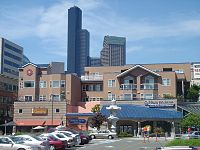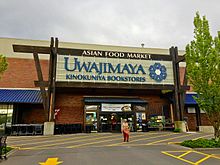Uwajimaya
Logo since 2020[1] | |
 Uwajimaya Village in Seattle's International District | |
| Company type | Asian supermarket |
|---|---|
| Industry | Retail, Food court |
| Founded | 1928 in Tacoma, Washington |
| Headquarters | Seattle, Washington |
Number of locations | 5 |
Area served | Washington, Oregon |
| Products | Japanese cuisine, Asian cuisine |
| Website | http://www.uwajimaya.com/ |
Uwajimaya, Inc., doing business as Uwajimaya Asian Grocery & Gift Markets (宇和島屋, Uwajimaya), is a family-owned supermarket chain with its corporate headquarters in the International District, Seattle, Washington,[2] and with locations in Greater Seattle and Oregon. Uwajimaya sells mainly Asian food—with an emphasis on Japanese—though it also stocks Western staples. The flagship store is in Seattle's Chinatown/International District with three other stores in Beaverton, Oregon, Bellevue, Washington and Renton, Washington. From 1968 to 1991 there was another store in the Southcenter Mall in Tukwila, Washington.
History
[edit]Uwajimaya was founded in 1928 by Fujimatsu Moriguchi of Yawatahama, Japan, in Tacoma, Washington. Fujimatsu sold fishcakes and other goods from his truck to Japanese farmers, loggers and fishermen at work sites.[3] Moriguchi named his company Uwajima-ya after the town of Uwajima (Ehime Prefecture), where he first entered the business (ya (屋) is the Japanese word for "store").[4]
As part of the internment of Japanese Americans following the entry of the United States into World War II, The US Government sent Moriguchi and his family to the Tule Lake Internment Camp in 1942. Upon their release, they moved to Seattle and set up shop at 422 S. Main Street in the International District.[5]
In the 1960s, Uwajimaya began to expand its offering of non-food items and imported food from Japan and other Asian countries[6] and experienced tremendous growth at the Century 21 Exposition in 1962. That same year, Fujimatsu Moriguchi died, and breaking with Japanese tradition, control of the company was passed to his four sons, rather than only his eldest son.[6] The sons subsequently divided ownership with their three sisters and their mother Sadako.[7]

In 1970, the store moved two blocks south to 6th Avenue S. and S. King Street, thus becoming one of the biggest in the Pacific Northwest, and expanded in 1978 adding more than half again its original size.[8] 1978 also saw the opening of the Bellevue Uwajimaya.
In 1991, Tokyo-based Kinokuniya Bookstore opened its first Seattle location on the second floor of the Seattle store selling primarily Japanese language books, movies, DVD, videos, music, and periodicals.
In 1998, Uwajimaya, with Lorig Associates, started developing Uwajimaya Village, a mixed retail, residential center that would take up three city blocks including the purchase and closure of S. Lane Street between 5th and 6th Avenues South. The Lane Street closure was controversial within the community, especially among some local small-business owners who were concerned that it would increase traffic, decrease emergency vehicle access, and have a negative economic impact on other businesses. The International District saw a protest of over 500 strong, the biggest street protests since the Kingdome was built.[9] Save Lane Street, a group formed to stop the street closure, collected over $140,000 and 4,000 signatures and sued both the city of Seattle and Uwajimaya. The group lost their case, eventually appealing to the King County Superior Court and then the state Court of Appeals.[3] In the end S. Lane Street was vacated to allow Uwajimaya to provide a pedestrian walkway to customer parking to the south.[10]

In 1998, Uwajimaya opened its third store, the first outside Washington located in Oregon near the Beaverton high-tech corridor.[11] This location was formerly a Jafco store, another retail chain founded in Seattle.[12]
Upon completion of the Uwajimaya Village project in 2000, the flagship store moved one block south to a building nearly twice the size of the previous store at 60,000 square feet (5,600 m2).[10] Uwajimaya Village includes a food court, bank, restaurant, optician, beauty salon, cellular wireless store, and cosmetic shop. The Kinokuniya Bookstore also relocated to a new location at the corner of 5th Avenue S. and S. Weller Street. Above the first floor of retail shops and underground parking garage is the 176-unit Uwajimaya Village Apartments.[13]
Sadako (Tsutakawa) Moriguchi, wife of Fujimatsu and sister of George Tsutakawa, died in 2002. She had worked in the store from its inception until she reached the age of 85.[7]
Uwajimaya opened another location in Renton, Washington on July 1, 2009.[14]
In August 2016, Uwajimaya announced its intention to launch a line of smaller, boutique stores known as "Kai Market by Uwajimaya".[15] Kai Market opened in Seattle's South Lake Union neighborhood in 2017, but closed in 2020 due to impacts from the COVID-19 pandemic.[16] It remains closed as of the start of 2023.[17]
-
Live seafood at Uwajimaya in Beaverton, Oregon
-
Interior of the Bellevue Uwajimaya in 2018
See also
[edit]References
[edit]- ^ "About Us". Uwajimaya. Archived from the original on May 16, 2023. Retrieved June 9, 2023.
- ^ "Uwajimaya Is Searching For A New Bag Design! Archived 2012-04-15 at the Wayback Machine" Uwajimaya. Retrieved on November 13, 2011. "Uwajimaya Corporate Office 4601 6th Avenue S., Seattle, WA 98108"
- ^ a b Davila, Florangela (November 30, 2000). "Uwajimaya celebrates its 'dream' store". Seattle Union Record. Archived from the original on March 26, 2005. Retrieved September 13, 2006.
- ^ "Company History of Uwajimaya". Uwajimaya, Inc. Archived from the original on July 15, 2006. Retrieved September 13, 2006.
- ^ Ramirez, Marc (October 8, 2008), "Uwajimaya, the Northwest's premier Asian supermarket, celebrates its 80th anniversary.", The Seattle Times, archived from the original on February 18, 2019, retrieved June 12, 2020
- ^ a b Tice, Carol (April 14, 2002). "Cash registers ring at Uwajimaya's new grocery store". Puget Sound Business Journal. Archived from the original on March 9, 2005. Retrieved September 13, 2006.
- ^ a b Long, Priscilla (July 29, 2002). "Moriguchi, Sadako Tsutakawa (1907-2002), Co-founder of Uwajimaya". Historylink.org . Archived from the original on December 18, 2019. Retrieved June 12, 2020.
- ^ Mulady, Kathy (July 9, 2001). "Historic Uwajimaya anchors the International District". Seattle Post-Intelligencer. Archived from the original on November 17, 2019. Retrieved September 13, 2006.
- ^ Jacklet, Ben (June 15, 1999). "The Great Mall of Chinatown". The Stranger. Archived from the original on February 7, 2006. Retrieved September 13, 2006.
- ^ a b "ULI Development Case Studies: Uwajimaya and Uwajimaya Village" (PDF). Urban Land Institute. October–December 2003. pp. 3, 6. Retrieved August 3, 2023.
- ^ Germain, Shanna (July 4, 2003). "Asian Tiger". Portland Tribune. Archived from the original on November 22, 2003. Retrieved September 13, 2006.
- ^ Adamsak, Phil (July 7, 1997). "Uwajimaya Food Outlet Will Test Oregon Market". Supermarket News. Archived from the original on May 11, 2021. Retrieved May 10, 2021.
- ^ Moriwaki, Lee (December 9, 2000). "The flavor is Asian: New Uwajimaya store is open". The Seattle Times. p. C5.
- ^ Yee, Sarah (June 2, 2011), "Renton Uwajimaya — A neighborhood grocery with a big name", Northwest Asian Weekly, archived from the original on June 12, 2020, retrieved June 12, 2020
- ^ Garnick, Coral (August 30, 2016). "Uwajimaya is expanding with a new boutique market concept". Puget Sound Business Journal. Archived from the original on September 2, 2016. Retrieved August 30, 2016.
- ^ Stearns, John (February 15, 2021). "Ask: Denise Moriguchi". 425 Business Magazine. Archived from the original on January 2, 2023. Retrieved January 2, 2023.
- ^ "Kai Market". Archived from the original on January 2, 2023. Retrieved January 2, 2023.
External links
[edit]- Uwajimaya Company Website
- Mainichi Daily News Article Jan 06[dead link]
- Cowan, Nils (March 20, 2017). "From Uwajimaya to internment and back again". Atavist. Retrieved January 31, 2021.
- Chiu, Iisa. "Chinatown International District: Dim sum and then some." Seattle Times. November 24, 2005. Modified on November 25, 2005.
- Ramirez, Marc. "Uwajimaya celebrates its 80th anniversary." Seattle Times. October 8, 2008.


